2024年12月27日
*英文の後に、日本語訳を記載しています。
- Hello, my name is Toscane Jourde. I’m 24 years old. I grew up in France, in Cherbourg, Normandy. I studied object design for 3 years in Paris, at an applied arts school called Olivier de Serres. I’m currently pursuing my studies in Lausanne, Switzerland, at ECAL. I’m in my third and final year. I took a year off between writing my thesis and my diploma project. During this year, I did a 6-month internship in Paris with designer Ronan Bouroullec’s studio, then came here to Japan for 2 months.
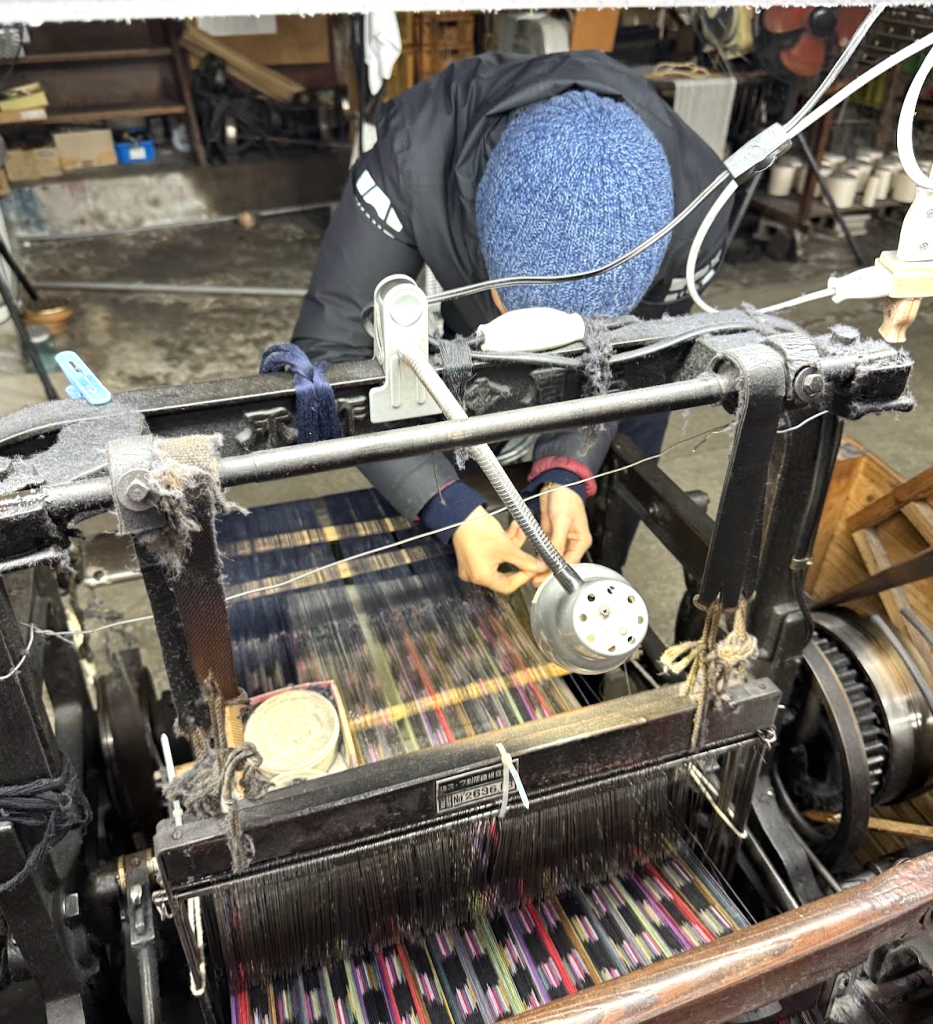
- I’ve always been fascinated by Japan. But since I’ve been here, the reality of what I’ve discovered here far exceeds the already great image I had of it. I’m very touched here by the respect of the people, their humility, calm and discipline. I find that people know how to live well on their own here, and also find pleasure and beauty in everyday life. The sentō is for me a good example of this culture of doing certain things alone while being deeply collective. I also find that nature has a lot of strength in Japan. From an object point of view, I found great beauty in everyday objects, and I think it’s this facet of design that interests me, i.e. everyday objects not signed by a designer. I was also impressed by the importance given to history and tradition. A man I met in Matsumoto told me that “history is what allows us to raise our children and respect our parents”, and I found that very beautiful.
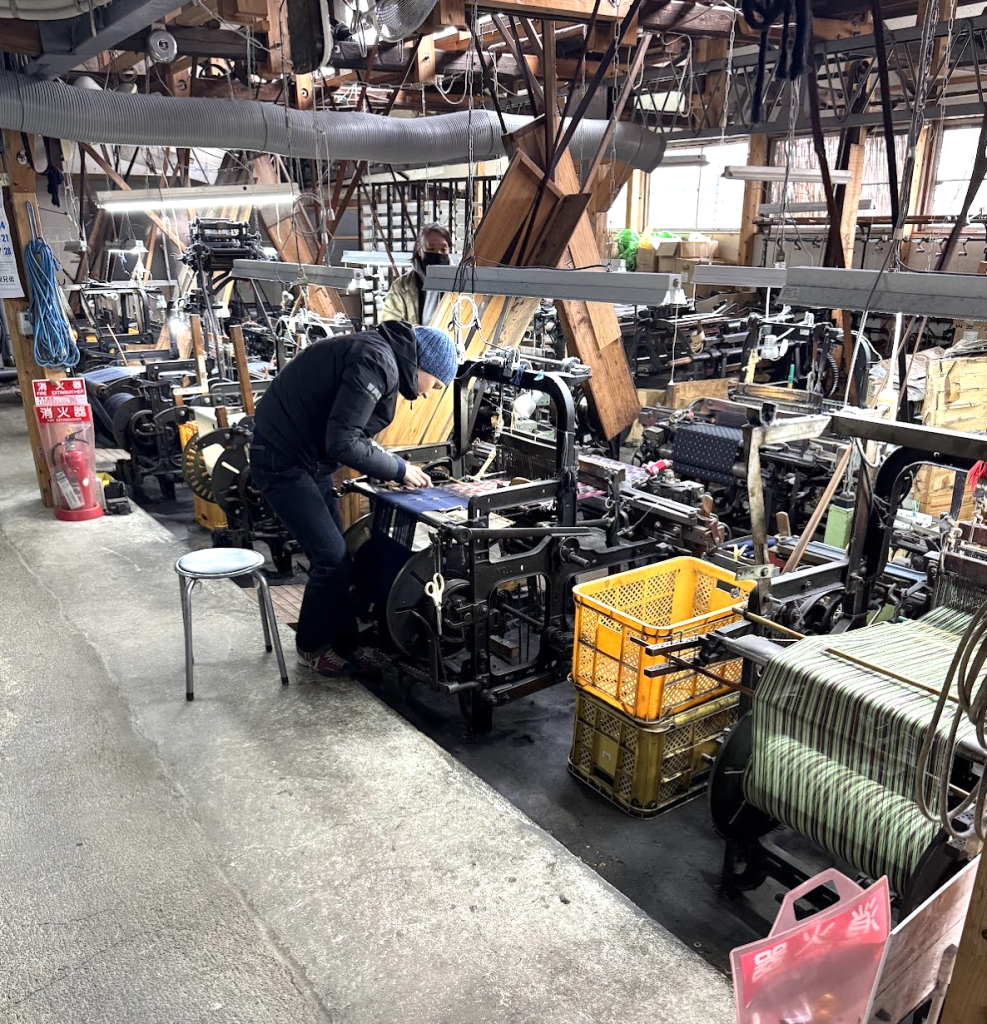
- So I’m studying object design, but I’ve always been interested in textile skills and knowledge. The mediums I turn to most naturally are often soft materials. I’m very interested in colors, patterns and textures. So I try to learn as much as I can about textiles myself. I discovered Kasuri because I did a personal research project last year on pattern in knitting. I wanted to try and obtain patterns by knitting balls or cones that I had previously dyed. Dip half the cone or ball in a dye bath, for example, and then knit. I really enjoy working iteratively, meaning from one experiment to the next. For this project, Kurume’s Kasuri was one of my references.
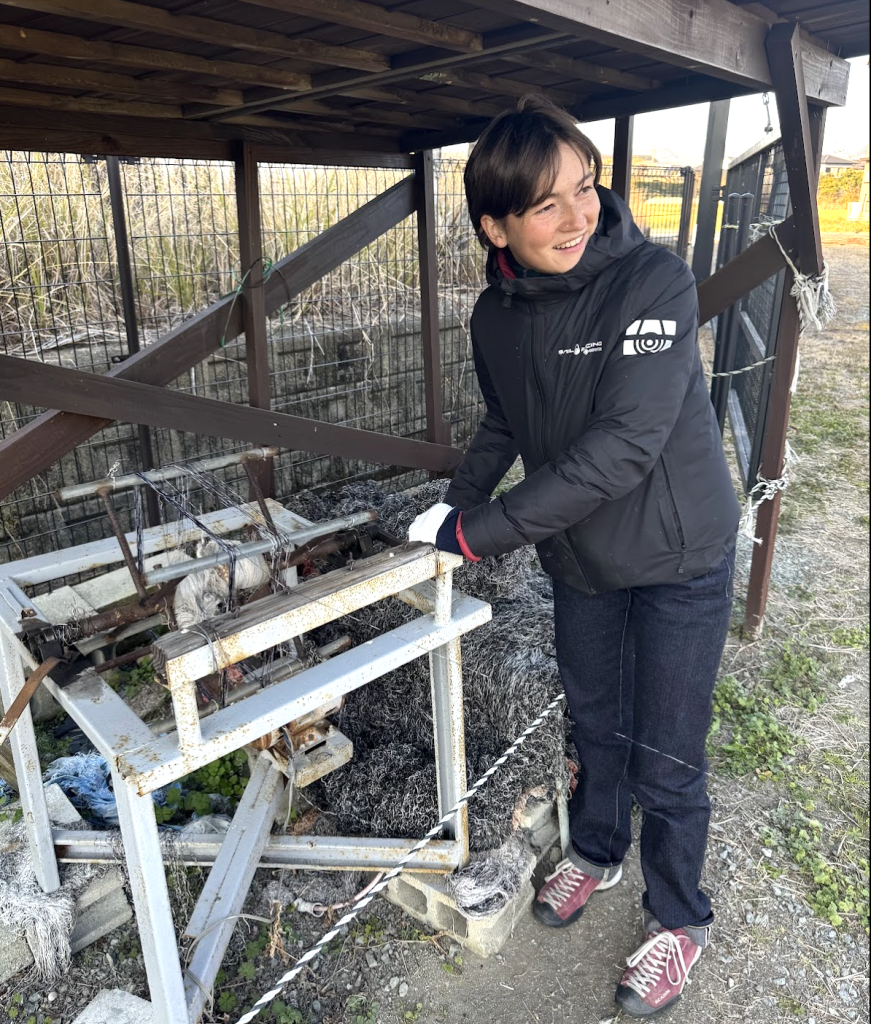
- I discovered Shimogawa-san’s work because my friends who are studying textile design at ENSCI in Paris came here 4 years ago on a study trip. I really wanted to be able to observe the technique for myself, simply in fact to understand it better, since I think it’s a complex process, and that in general with textiles, observing or practicing are more effective than words I find.
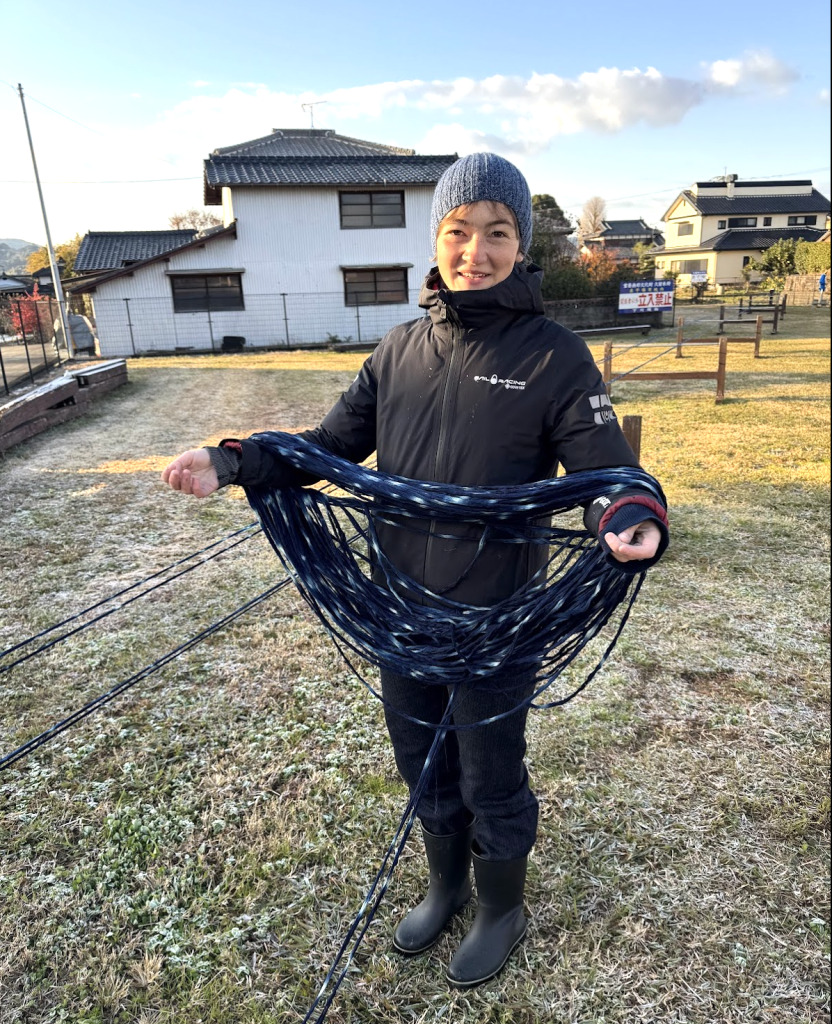
- I stayed for 1 week, because I’m going back to France in a few days. But now I’d really like to be able to come back here to learn for longer. I’d say that the process is clear to me, but in broad outline of course, and I imagine there are lots of great little details to know. The great thing is that Kyozo-san is super generous in sharing his work. Kasuri creations seem hyper-delicate and inaccessible to someone like me, and yet Kyozo-san invited me to make every gesture and step he showed me. So thank you for the trust and the relaxed state of mind. And I find that it’s really the most effective way of learning and understanding. All the more so as so many things are done through very small, specific and repetitive gestures. After 2 days, Kyozo-san had me assemble the warp of a loom, which seemed to me to be the most complex and incomprehensible thing ever seen from the outside, and in fact by manipulating it you understand the logic. I also found it very interesting to see the direction Kyozo-san wanted to give to this company, which before him had been run by his father. There are a lot of issues linked to these companies that use ancient crafts. How can we keep them going today? You can feel that kyozo-san is very proud of his know-how, and I have the impression that a large part of his work today is dedicated to mediation (conferences, fairs, hosting guests as he did with me, visits of the workshop, or even the perfect example is this initiative of video interviews to document the experiences of those who have visited him). I found it interesting to get a look behind the scenes of what it’s like to run a craft-based business in Japan today. To see both the business and the office side of things, so as not to have only a romantic vision of Japanese craftsmanship, and to realize that it’s not in fact disconnected from the realities of our current system, and that Kyozo-san is working on the compatibility of one with the other.
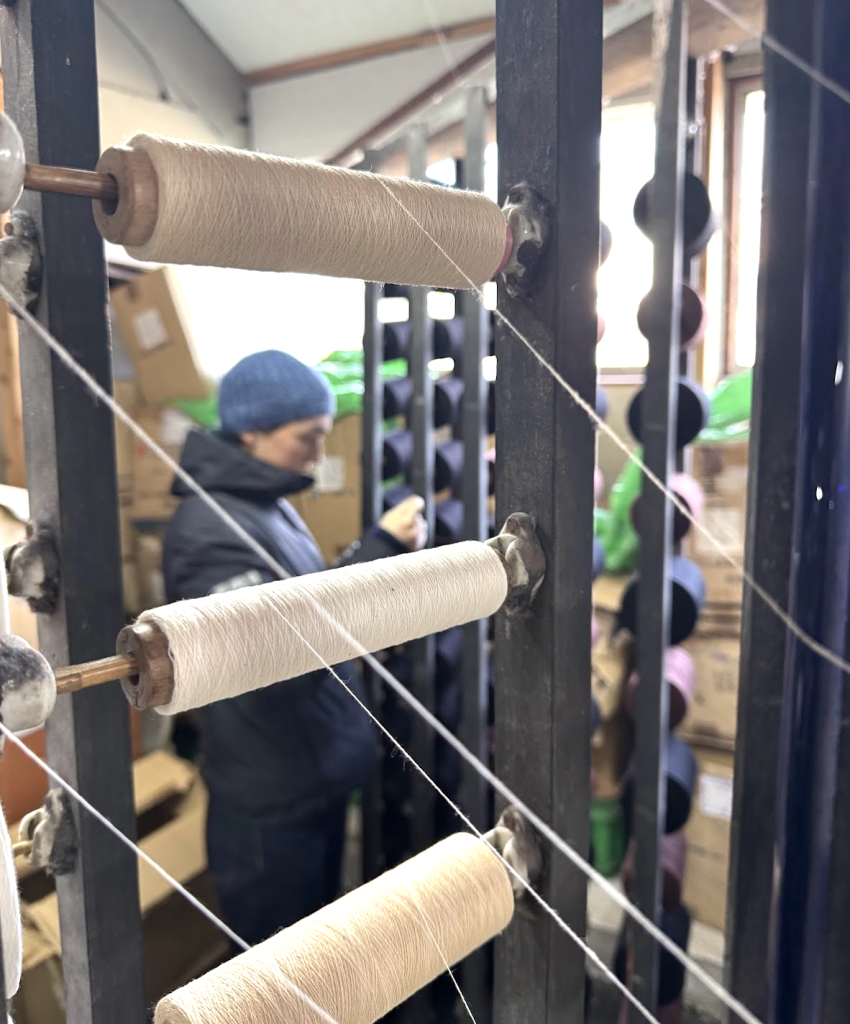
- In February I’m going back to school for my last semester, during which I’ll be doing my diploma project. I don’t yet know what it’s going to be about, but I think I’ve found a lot of inspiration in Japan. I’d like to concentrate on beautifully designed everyday objects, without them becoming a show of force by the designer behind them. I think I’d like to take an interest in designing elements that are integrated into the domestic habitat: handles, switches, plugs and so on. I’d also like to learn Japanese so I can connect more with others here.
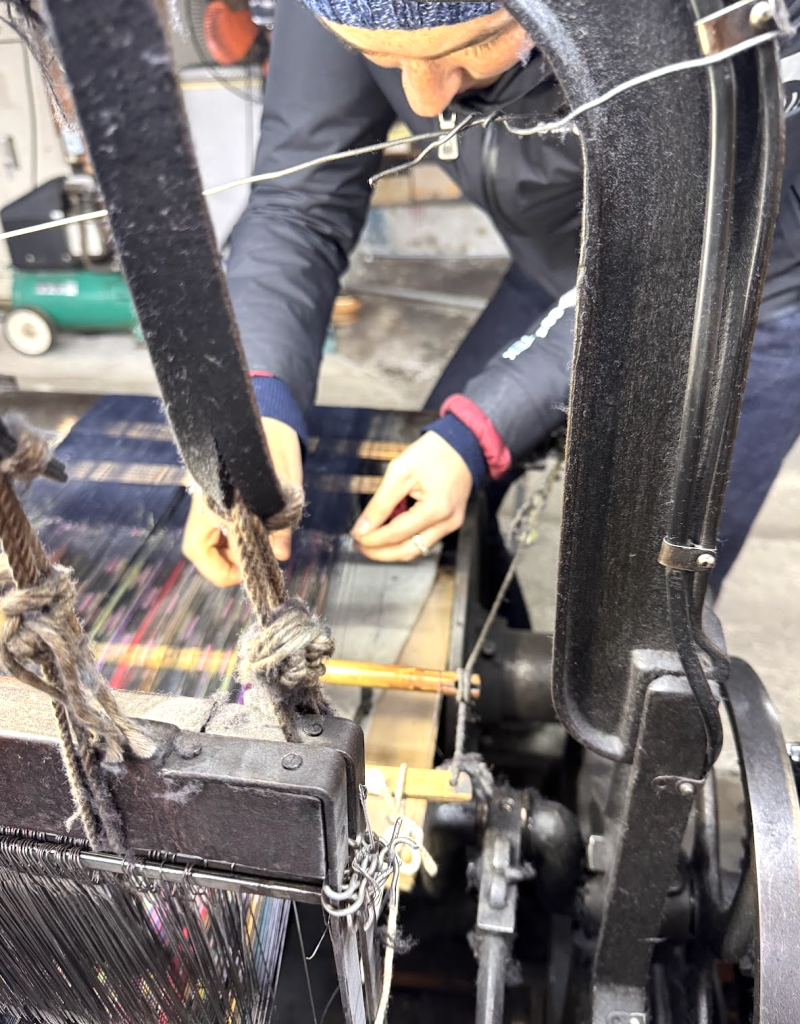
インタビュー内容
名前、所属
日本への興味
絣への興味
下川織物への訪問のきっかけ
滞在の印象
来年の目標
- こんにちは、私の名前はトスカーヌ・ジュールです。私は24歳です。フランスのノルマンディー地方、シェルブールで育ちました。パリのオリヴィエ・ド・セールという応用美術学校で、オブジェクトデザインを3年間学びました。現在はスイスのローザンヌにあるECALで学び続けており、最終学年の3年目です。卒業論文と卒業制作の間にギャップイヤーを取ったのですが、その間、パリでデザイナーのロナン・ブルレックのスタジオで6ヶ月間のインターンシップをした後、2ヶ月間日本に来ました。
- 私はずっと日本に魅力を感じていました。しかし、実際に日本に来てみて、そこで発見した現実は、私が持っていたすでに素晴らしいイメージを遥かに超えていました。ここでは、人々の尊敬の念、謙虚な性格、静けさ、そして規律にとても感動しています。ここでは、人々が一人で過ごすことができ、また日常生活の中に楽しみや美を見出していると感じます。銭湯は、個人が集団の中で何かを一人で行うという文化の良い例だと思います。また、日本では自然が非常に力強いと感じています。物の視点から見ると、私は日常的な物に大きな美を見出し、それが私の関心のあるデザインの一つの側面だと考えています。つまり、デザイナーの名前がついていない日常的な物に興味があります。また、歴史や伝統が非常に重要視されている点にも驚きました。松本で出会った男性が「歴史は私たちが子どもを育て、親を敬うためのものだ」と言ったことがとても美しいと思いました。
- 私はオブジェクトデザインを学んでいますが、常にテキスタイルの技術や知識に引かれてきました。私が最も自然に手を伸ばすメディアは、しばしば柔らかい素材です。色、パターン、テクスチャーに非常に興味があります。ですので、テキスタイルについてはできるだけ自分で学ぼうとしています。私は、昨年、編み物のパターンに関する個人的な研究を行ったことで、絣(かすり)を知りました。私は、以前に染めたボールやコーンを使ってパターンを得ようとしたかったのです。例えば、コーンやボールの半分を染色液に浸し、それから編むという方法です。私は反復的な作業で進めるのが好きで、実験から実験へと進んでいくことが好きです。ですので、このプロジェクトでは、久留米の絣が私の参考の一つでした。
- 私が下川さんの作品を知ったのは、パリのENSCIでテキスタイルデザインを学んでいる友人たちが4年前に日本に来て、研修旅行をしていたからです。私はこの技術を自分で観察したいと思っていました。実際、よりよく理解するために、それが複雑なプロセスだと思うからです。一般的に、テキスタイルに関しては、言葉よりも観察や実践の方が効果的だと思います。
- 1週間滞在して、もうすぐフランスに戻ります。しかし、ここにもっと長く滞在して学びたいと思っています。1週間でこのプロセスをかなり理解できたと思います。概略としてははっきりしていると言えますが、もちろん詳細な部分にはまだ多くのことがあると思います。素晴らしいのは、下川さんが自分の仕事を非常に惜しみなく共有してくださったことです。絣の作品は、私のような未経験者にはとても繊細で手が届かないものに見えますが、それでも下川さんは、私が自分で各工程を行うようにと招いてくれました。信頼とリラックスした気持ちに感謝します。そして、それが学び理解するための最も効果的な方法だと感じました。特に、非常に小さな、非常に特定的で反復的な動作の中で多くのことが進んでいくのです。2日後には、下川さんは私に織機のチェーンを組み立てさせてくれました。外から見ると最も複雑で理解できないものに思えましたが、実際に扱ってみるとその論理がわかります。また、下川さんがこの会社にどんな方向性を持たせようとしているのかも非常に興味深く感じました。この会社は、彼の父親から引き継いだもので、古来の技術を使う企業に関連する多くの問題があると思います。どのようにして現代においてその技術を継続させていくか。下川さんが自分の技術に誇りを持っているのを感じましたし、現在の仕事の多くは、ミーティングや展示会、私のような人を受け入れ、ワークショップを見学させること(また、下川さんが行ったように、ビデオインタビューを通じて経験をドキュメントすること)に費やされていると感じます。日本の現代の工芸企業を管理する裏側を垣間見ることができたのはとても興味深かったです。ビジネスやオフィスの側面を見ることで、日本の工芸に対するロマンチックなビジョンだけでなく、現実的なシステムの中でどのようにそれが適応していくのかも見えてきました。
- 2月に最後の学期が始まり、卒業制作を行う予定です。まだテーマは決まっていませんが、日本で多くのインスピレーションを得たと思います。デザイナーの力を見せつけることなく、美しくデザインされた日常の物に焦点を当てたいと考えています。家の中で使われるアイテム、例えば取っ手や電気のコンセントなどをデザインすることに興味があると思います。また、もっと多くの人と繋がるために日本語も学びたいと思っています。
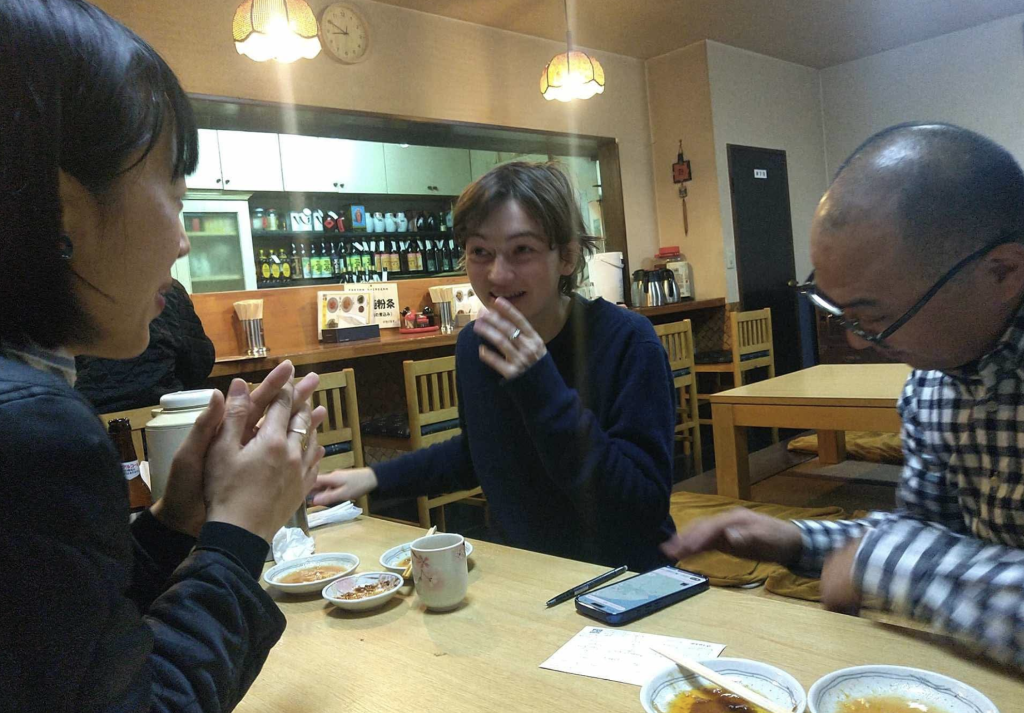
トスカーヌ・ジュールについて
スイスの美術大学の学生であるトスカーヌは、ギャップイヤーという制度の期間を利用して日本に初来日。2ヶ月間の日本旅行も終わりに近づいた12月22日に下川織物を訪れ、23日から27日まで工場の中で久留米絣の制作を体験した。彼女が長年抱いていた日本のイメージと実際に体感した日本。そこから得られた新たな発見についてのインタビュー。事前に下川織物への訪問を入念に計画されていたものではなかったものの、フランスの友人などを通じて下川織物のことは聞いていたようで日本滞在中にぜひ訪問したいという願望はあったようです。結果的には年末の急な訪問となりましたが実際に会ってみると彼女は、謙虚で礼儀正しく規律を重んじて協調性のある優しい女性でした。初めての来日で西日本エリアの様々な場所を訪れていたようですが、おそらくどこに行っても、その土地で会った日本人と心のこもった交流をしていたように感じました。その中でも最も印象に残る滞在の一つになったと別れ際に言ってくれたことが、とても嬉しく思いました。来年、大学を卒業したらデザイナーになって、近い将来、再び下川織物を訪れて、コラボレーション制作をしたいという夢を語ってくれました。
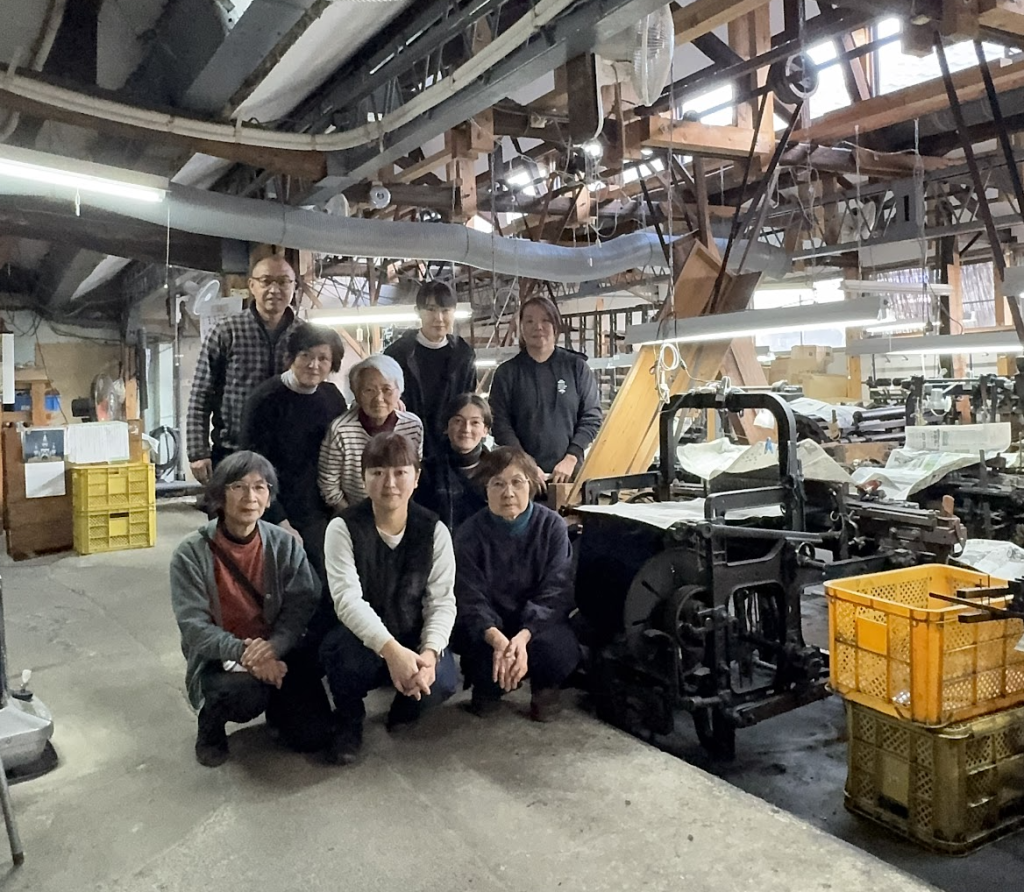
久留米絣織元 下川織物
E-MAIL info@oriyasan.com
instagram http://instagram.com/shimogawakyozo/
facebook https://www.facebook.com/shimogawaorimono
X @kasuritter
YouTube https://www.youtube.com/channel/UCOZennIqkscFGNJLwnTOyKg
Threads https://www.threads.net/@shimogawakyozo